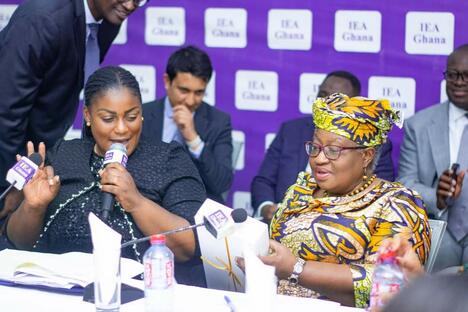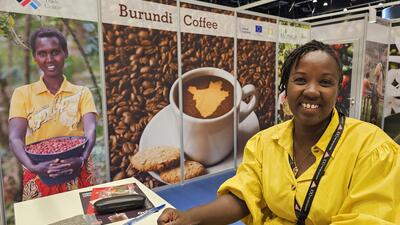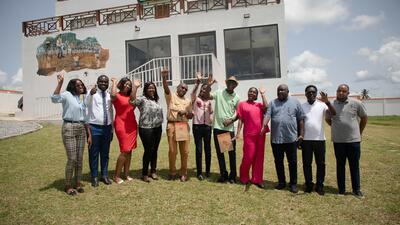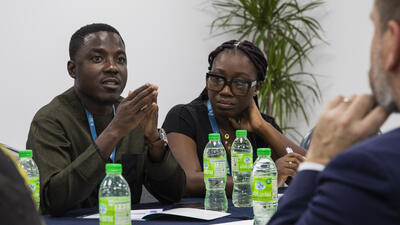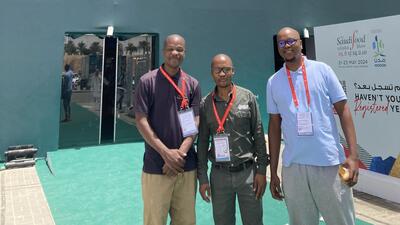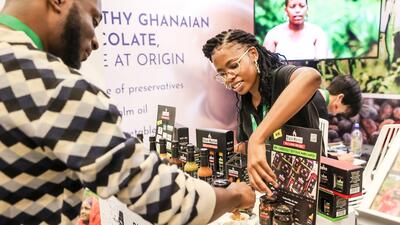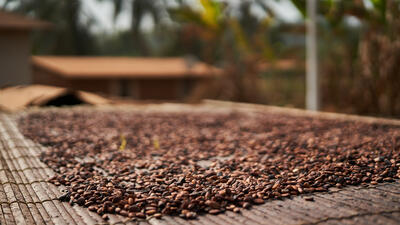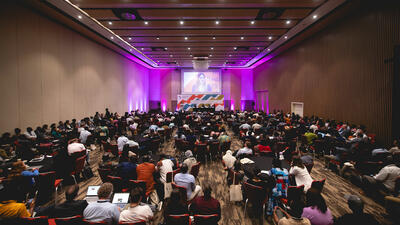


Ghana makes great cocoa and wants to make even better chocolate
ITC is supporting small cocoa processors and chocolate brands in Ghana in reaching new markets and growing their operations. Flexy Foods is one of these small brands targeting the rising demand for niche, artisanal products made in Ghana.
Ghana produces some of the world’s best cocoa, but imports most of the chocolate it consumes. Today, the country is attempting to address this paradox by establishing processing operations in-country.
While the idea of a cocoa-growing country producing its own chocolate makes sense, in practice it’s no easy feat. Restricted access to finance, expensive imported equipment, and the ever-rising cost of raw materials are some of the biggest obstacles.
Lucy Afari is CEO of Flexy Foods Limited, a small artisan agribusiness in Ghana with its own chocolate brand, Kamini Chocolates. ‘Ghana grows cocoa, but it’s mainly destined for export,’ says Lucy. ‘So as artisans, we struggle with high raw material costs. We have to source it from export companies with export rates and taxes.’
Ghana Cocobod, the board tasked with regulating Ghana’s domestic cocoa, coffee and shea nut marketing, is establishing a framework for artisans to better access to cocoa beans. This will make it cheaper for artisans like Lucy to get raw materials.
‘This shows they recognize that there is opportunity for local value addition and a Ghana-made products market. They are encouraging and driving this agenda,’ she said. The International Trade Centre (ITC) and the Association of Ghana Industries (AGI) are supporting these policy advocacy efforts under the Netherlands Trust Fund V (NTF V) programme.
Flexy Foods/ Kamini Chocolates is a woman-owned artisanal chocolatier and an NTF V programme beneficiary partners in Ghana. They are part of the Ghana Export Promotion Authority (GEPA) cohort. Lucy kicked off her brand in 2019, when she realized that chocolate makers in Ghana were sorely lacking. Since then, the chocolate brand has been growing steadily, with plans to export on the horizon.
A small brand that offers solutions and niche products
Apart from being a Ghana-made brand, Kamini Chocolates addresses local and international competition by offering small batch production, with a maximum annual volume of 1.2 tons.
‘Most large factories require that you buy large volumes from them. We make small batches, just 20 pieces for example. We also do white label production for chocolate brands in minimal quantities that they find to be a flexible option,’ says Lucy.
Kamini Chocolate also ventured into the vegan market, following market feedback from ITC on specialty chocolate consumer preferences, which included healthy options, especially after the pandemic. It also made sense for the brand logistically as powdered milk supply was interrupted during COVID-19, making vegan alternatives a sound business move.
Lucy says they also make a point of using locally produced cashew and tiger nuts to reinforce their Made in Ghana ethos. Their tiger nut product won them the Innovative Startup Award for 2022 by the Council for Scientific and Industrial Research (CSIR) in Ghana.
Working with ITC to grow at home and abroad
Recently, ITC’s Alliances for Action initiative organized a training on branding and marketing in partnership with GEPA for Kamini Chocolates and the other companies in the NTF V programme. Lucy later had a one-on-one coaching session to improve and customize their chocolate recipes.
They presented the customized chocolates to Dr. Ngozi Okonjo-Iweala, Director-General of the World Trade Organization, during the MSME fair organized by GEPA – an event that focused on women entrepreneurs trading and exporting digitally, from agricultural products to luxury fashion and cosmetics made in Ghana.
‘Currently we want to establish ourselves as a go-to brand in Ghana,’ says Lucy. ‘With ITC’s capacity building support, we’re working towards being export-ready as well to capitalize on opportunities, through financial management and marketing trainings.’
Lucy highlights their participation in the upcoming prestigious Salon du Chocolat event in Paris funded by the NTF V programme as a key step towards accessing the European market. She also said ITC’s data sharing on market research has been instrumental in improving their products and operations.
‘In five years, we’ll be on most of your shelves in Europe,’ she says. ‘Our next conversation will be about how much we’ve exported and how much we’ve grown – both in Africa and beyond as well.’
About the project
The Netherlands Trust Fund V (NTF) (July 2021 – June 2025) is based on a partnership between the Ministry of Foreign Affairs of The Netherlands and the International Trade Centre. The programme supports MSMEs in the digital technologies and agribusiness sectors. Its ambition is two-fold: to contribute to an inclusive and sustainable transformation of food systems, partially through digital solutions, and drive the internationalization of tech start-ups and export of IT&BPO companies in selected Sub-Saharan African countries.





